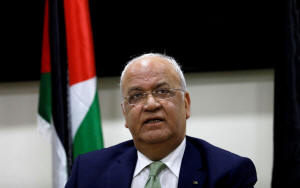Palestinian negotiator Erekat dies after contracting COVID-19
 Send a link to a friend
Send a link to a friend
 [November 10, 2020]
By Stephen Farrell, Rami Ayyub and Ali Sawafta [November 10, 2020]
By Stephen Farrell, Rami Ayyub and Ali Sawafta
JERUSALEM/RAMALLAH, West Bank (Reuters) -
Saeb Erekat, one of the most experienced and high-profile advocates for
the Palestinian cause over decades of dispute with Israel, died on
Tuesday after contracting COVID-19. He was 65.
Having sat down with Israeli and U.S. leaders in the 1990s and 2000s, in
recent years Erekat was the principal face of a war of words with
President Donald Trump's administration over a Middle East plan that
envisaged leaving Israel in control of Jewish settlements and large
parts of the occupied West Bank.
But after peace talks collapsed in 2014 he remained a firm backer of the
negotiated creation of a future Palestinian state co-existing alongside
Israel even if, in his own words, it took 50 years.
Erekat, the secretary general of the Palestine Liberation Organization,
said on Oct. 8 he had contracted the coronavirus. Three years earlier he
had undergone a lung transplant in the United States that left his
immune system compromised.

He died following multiple organ failure after being hospitalised for
three weeks in Jerusalem's Hadassah Medical Center, a spokeswoman for
the Israeli hospital said. He had required ventilation and specialised
drug treatment, she added.
"Saeb has shown an extraordinary patience and resilience, with the same
determination that has characterized his career to achieve freedom for
Palestine and a just and lasting peace in our region," his daughter
Dalal posted on Twitter.
His funeral is expected to be held on Wednesday in the West Bank city of
Jericho.
"DEEP SORROW"
Fluent in English as well as his native Arabic, Erekat was a spokesman
for Palestinian leaders such as Yasser Arafat and Mahmoud Abbas, though
never a serious candidate to succeed them.
One of the youngest members of the Palestinian leadership, Erekat was
unusual in not having spent decades in exile with Arafat and Abbas, the
older generation of his Fatah faction, which dominates the PLO.
Abbas declared three days of mourning, calling his death "a big loss for
Palestine and our people".
"We feel deep sorrow for losing him, especially at such difficult times
the Palestinian cause is living through," Abbas' office in Ramallah in
the occupied West Bank said.
Tzipi Livni, a former Israeli foreign minister, said he had dedicated
his life to his people. "Reaching peace is my destiny he used to say.
Being sick, he texted me: 'I’m not finished with what I was born to do'.
My deepest condolences to the Palestinians and his family. He will be
missed," she wrote on Twitter.

Well-known in diplomatic circles across the world, he regularly featured
in the international media.
But a younger generation of Palestinians disillusioned with a
long-stagnant peace process increasingly questioned whether Erekat's
favoured vision of a two-state solution was even possible any more.
Some instead advocated a "one-state solution" of Israelis and
Palestinians living side-by-side with equal rights, in a single country.
But having sat opposite Israeli leaders, Erekat regarded the one-state
concept as unworkable, aware that Israel would reject it as a
demographic liability undermining its ability to be both a Jewish and a
democratic state. He maintained a two-state outcome was the solution.
"If not this year, in five years, 10 years, 50 years. But the
unfortunate thing is the longer it takes, the more victims, the more
people will be killed, the more violence, the more extremism. Saving
lives is about going the path of two states, and it is doable," he told
Reuters in July 2019.
[to top of second column]
|

Chief Palestinian negotiator Saeb Erekat looks on during a news
conference following his meeting with foreign diplomats, in
Ramallah, in the Israeli-occupied West Bank January 30, 2019.
REUTERS/Mohamad Torokman/File Photo

JERICHO TO CAMP DAVID
When he was born in 1955, his family was living in Abu Dis, a
village on the outskirts of Jerusalem. When he was young they moved
to Jericho in the Jordan Valley, and he was 12 when Israel captured
the territory along with the rest of the West Bank in the 1967
Middle East war.
He left the West Bank in the 1970s to go to college.
After studying political science and international relations at San
Francisco State University and gaining a doctorate in peace studies
at Bradford in Britain, he worked as a lecturer in the West Bank
city of Nablus before becoming a journalist.
Erekat first gained international recognition in 1991 when he was
appointed vice-chair of the Palestinian negotiating team at the
Madrid Peace Conference during the U.S. presidency of George H.W.
Bush.
After Arafat returned from exile in the mid-1990s following interim
peace agreements, Erekat oversaw preparations for elections under
the newly created Palestinian Authority, and was himself elected to
parliament.
He became increasingly prominent as a negotiator, taking part in the
Camp David summit hosted by U.S. President Bill Clinton in 2000.
But those talks failed and the second Palestinian uprising broke out
three months later, leading to five years of bloodshed and
marginalising advocates of a negotiated two-state solution.

In 2006 Erekat's Fatah faction was weakened when it lost elections
to its increasingly powerful domestic rival, the Islamist militant
group Hamas, which rejects peace with Israel.
A year later, Hamas took over the Gaza Strip by force, dealing a
further blow to Fatah's credibility.
With Israel in control of East Jerusalem and Hamas in Gaza, Fatah
was left with just limited self-rule in parts of the West Bank,
among scores of Israeli settlements.
The Palestinians also found themselves increasingly isolated after
Israeli voters from 2009 elected successive right-wing governments
headed by Prime Minister Benjamin Netanyahu – long a critic of the
Palestinian leadership.
Another challenge came with the election of President Donald Trump
in 2016 - a year later the Palestinians stopped dealing with Trump,
accusing him of pro-Israel bias.
In the last three months of Erekat’s life, the Palestinians faced
shifting regional priorities when two Gulf Arab states suddenly
signed diplomatic deals with Israel, reflecting shared fears of Iran
and hopes of increased trade.
Asked a year before his death if there was a danger of the middle
ground of Palestinian politics disappearing, Erekat told Reuters:
"It's happening. These are my sons and daughters and grandchildren.
And they look at me in the eye and they say, ‘You did not deliver.
Let the struggle change'."
(Additional reporting by Nidal al-Mughrabi in Gaza and Dan Williams
in Jerusalem; Editing by Jeffrey Heller, Angus MacSwan and Alison
Williams)
[© 2020 Thomson Reuters. All rights
reserved.] Copyright 2020 Reuters. All rights reserved. This material may not be published,
broadcast, rewritten or redistributed.
Thompson Reuters is solely responsible for this content.
 |